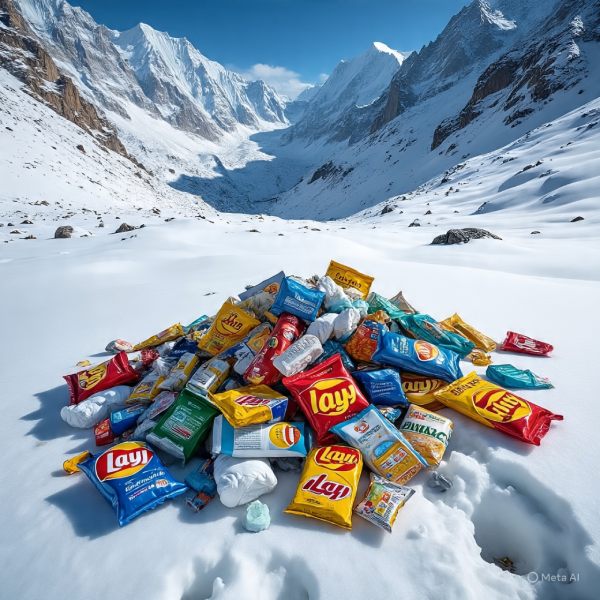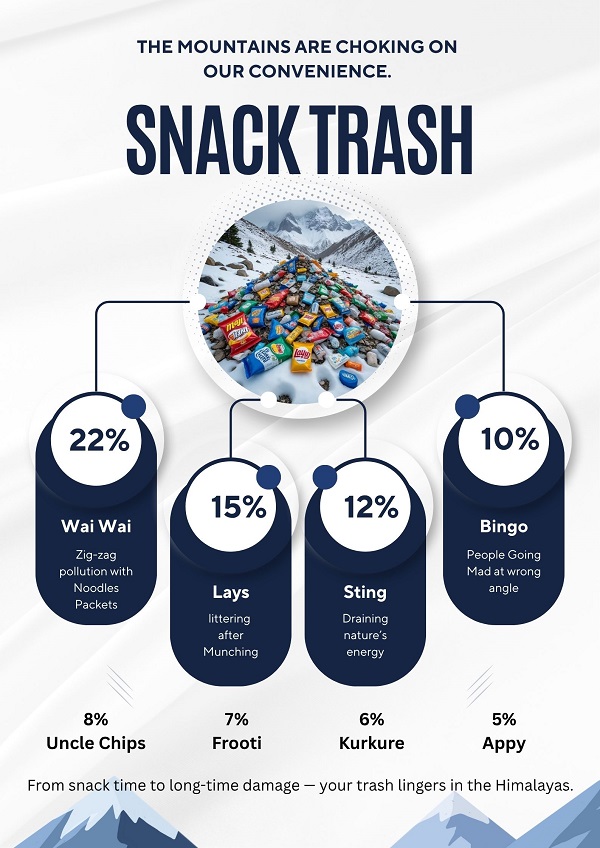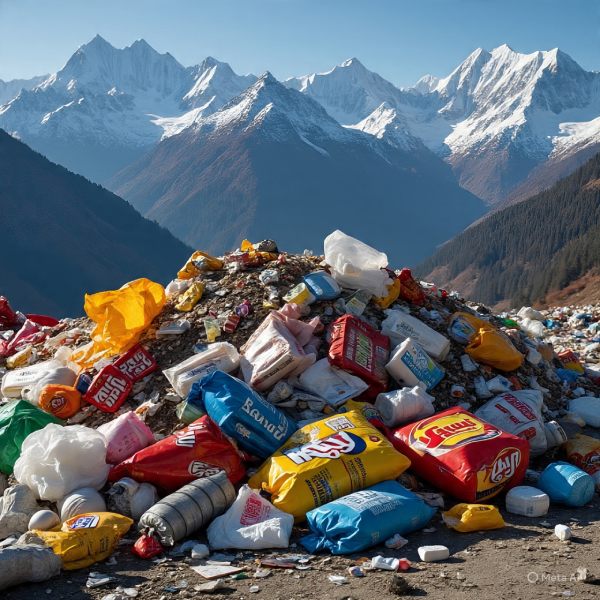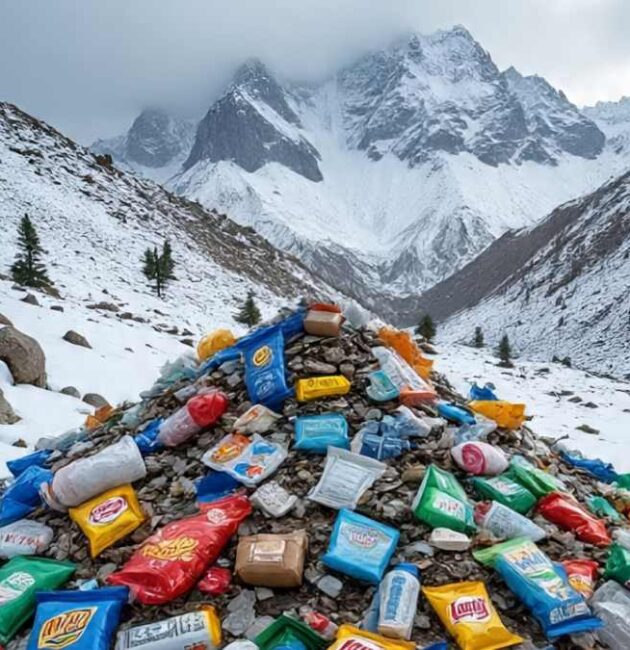The majestic Himalayas, revered as the abode of gods and the source of our holiest rivers, are drowning in an ocean of plastic waste. What was once pristine wilderness is now littered with the remnants of our throwaway culture, painting a disturbing picture of how far we have strayed from living in harmony with nature.

The Himalayan Cleanup (THC) 2024, organized by Zero Waste Himalaya and Integrated Mountain Initiative, has revealed shocking statistics that should make every Indian pause and reflect on their daily choices. Over 15,000 volunteers across nine mountain states collected and audited 121,739 pieces of waste from 350 sites. The findings are nothing short of alarming: a staggering 87.7% of all waste found was plastic, with 75.2% being non-recyclable plastic that will persist in our environment for centuries.
The Junk Food Invasion of the Himalayas
Perhaps the most disturbing revelation is that 84.2% of all plastic waste collected consisted of food packaging. This represents a devastating transformation of the Himalayan region’s food culture. WaiWai, Lays, Uncle Chips, Bingo, Kurkure, Center Fresh, and Maggi – these brand names now litter the slopes where once only wildflowers bloomed. What does this say about us as a society?

Our ancestors in these mountain regions thrived on locally grown grains, vegetables, and traditional foods that nourished both body and soul without leaving a trace of environmental destruction. Today, we have traded this wisdom for the convenience of processed foods wrapped in layers of plastic that cannot be recycled or safely disposed of in these remote areas.
The data shows food wrappers alone constitute 55% of all plastic waste found, while beverages account for another 18%. Every time someone chooses a packet of chips over locally grown potatoes, or a plastic bottle of juice over fresh mountain spring water, they are casting a vote for the destruction of one of the world’s most fragile ecosystems.
Sikkim: A Cautionary Tale
Sikkim, despite being one of India’s smallest states, collected the highest amount of trash – 53,814 pieces across 86 sites, representing 44% of total waste audited. This organic state, which banned plastic bags and styrofoam products years ago, still struggles with the influx of packaged goods and tourist-generated waste. If Sikkim, with all its environmental consciousness, faces such challenges, what does this say about the scale of the crisis across India?
The irony is bitter: tourists flock to these pristine locations to escape the pollution of cities, only to bring that very pollution with them in the form of packaged snacks, bottled water, and single-use items. Darjeeling, famous worldwide for its tea gardens, now competes with Sikkim in waste generation, with 36,180 items of trash collected from just 37 sites.
Beyond Food: The Complete Lifestyle Transformation
The waste audit reveals how deeply our consumption patterns have penetrated even the remotest corners of the Himalayas. Personal care products, particularly shampoo sachets at 38% of personal care waste, tell the story of how multinational corporations have convinced even mountain communities to abandon traditional hair care methods passed down through generations.

Menstrual products constitute 10% of personal care waste, indicating a shift from traditional, eco-friendly menstrual practices to disposable products that take centuries to decompose. Diapers account for 20% of this category – in regions where children once grew up using cloth alternatives that could be washed and reused indefinitely.
The rise of online shopping has also reached these remote areas, with packaging materials including plastic films (39.3%) and foam coolers (32.4%) now polluting landscapes that were once untouched by commercial packaging.
The True Cost of Our Convenience
Every piece of plastic waste found in the Himalayas represents a choice – our choice to prioritize convenience over environmental responsibility. When we buy a packet of instant noodles instead of preparing traditional dal-chawal, we are not just consuming food; we are consuming the future of our planet.
The Himalayas are not just mountains; they are the water towers of Asia, feeding rivers that sustain over a billion people. The glaciers that provide water to the Ganga, Yamuna, Brahmaputra, and Indus are now contaminated with microplastics that eventually make their way into our food chain. We are literally poisoning the sources of our own sustenance.
A Crisis of Values
This environmental catastrophe reflects a deeper crisis – the erosion of our values and connection to nature. Our scriptures speak of “Vasudhaiva Kutumbakam” – the world as one family – yet our actions suggest we care little for the home we share with all living beings.
The traditional Indian philosophy of living within our means, taking only what we need, and leaving no waste behind has been abandoned for a culture of excess and disposal. Our grandparents lived fulfilling lives without generating even a fraction of the waste we produce today. They understood that every action has consequences, not just for us but for future generations.
The Path Forward: Reclaiming Our Heritage
The solution lies not in advanced technology or government regulations alone, but in returning to the wisdom of our ancestors while adapting to modern realities. We must reject the false narrative that development requires environmental destruction.
Every Indian must ask themselves: Do I really need that packaged snack, or can I choose local alternatives? Can I carry a reusable water bottle instead of buying plastic ones? Can I support local food systems instead of processed foods that travel thousands of kilometers wrapped in plastic?
The volunteers who participated in THC 2024 have shown us the way. They didn’t wait for someone else to clean up the mess; they took responsibility for their environment.
Their message is clear: “We don’t need a handful of people doing zero waste perfectly. We need millions of people doing it imperfectly.”
Our Moral Imperative
The Himalayas are burning – not with fire, but with the slow poison of our negligence. Every plastic wrapper, every disposable item, every thoughtless purchase is a small act of violence against the very ecosystem that sustains us. We have treated our most sacred landscapes as dumping grounds for our excess. But it’s not too late. The same hands that created this mess can clean it up. The same minds that chose convenience can choose sustainability. The same hearts that once revered nature can learn to love it again.
The question is not whether we can afford to change our lifestyle – it’s whether we can afford not to. The Himalayas are calling out to us, not in anger but in hope, believing that their children will remember their responsibility to the earth that birthed them.
The time for excuses is over. The time for action is now. Our mountains are watching, and history will judge us by the choice we make today.




